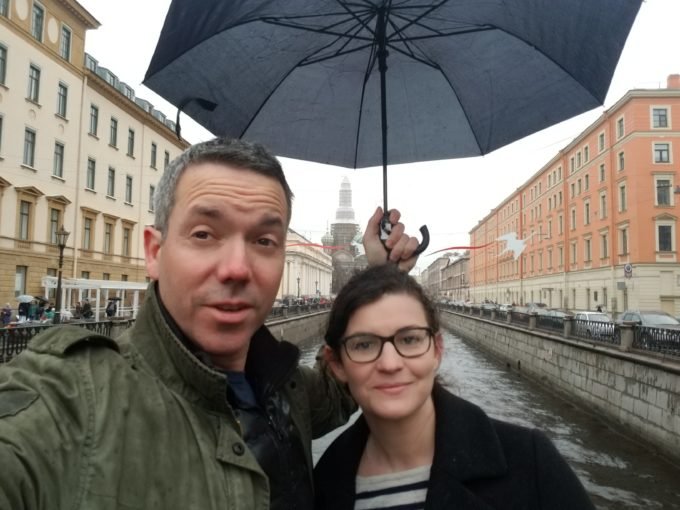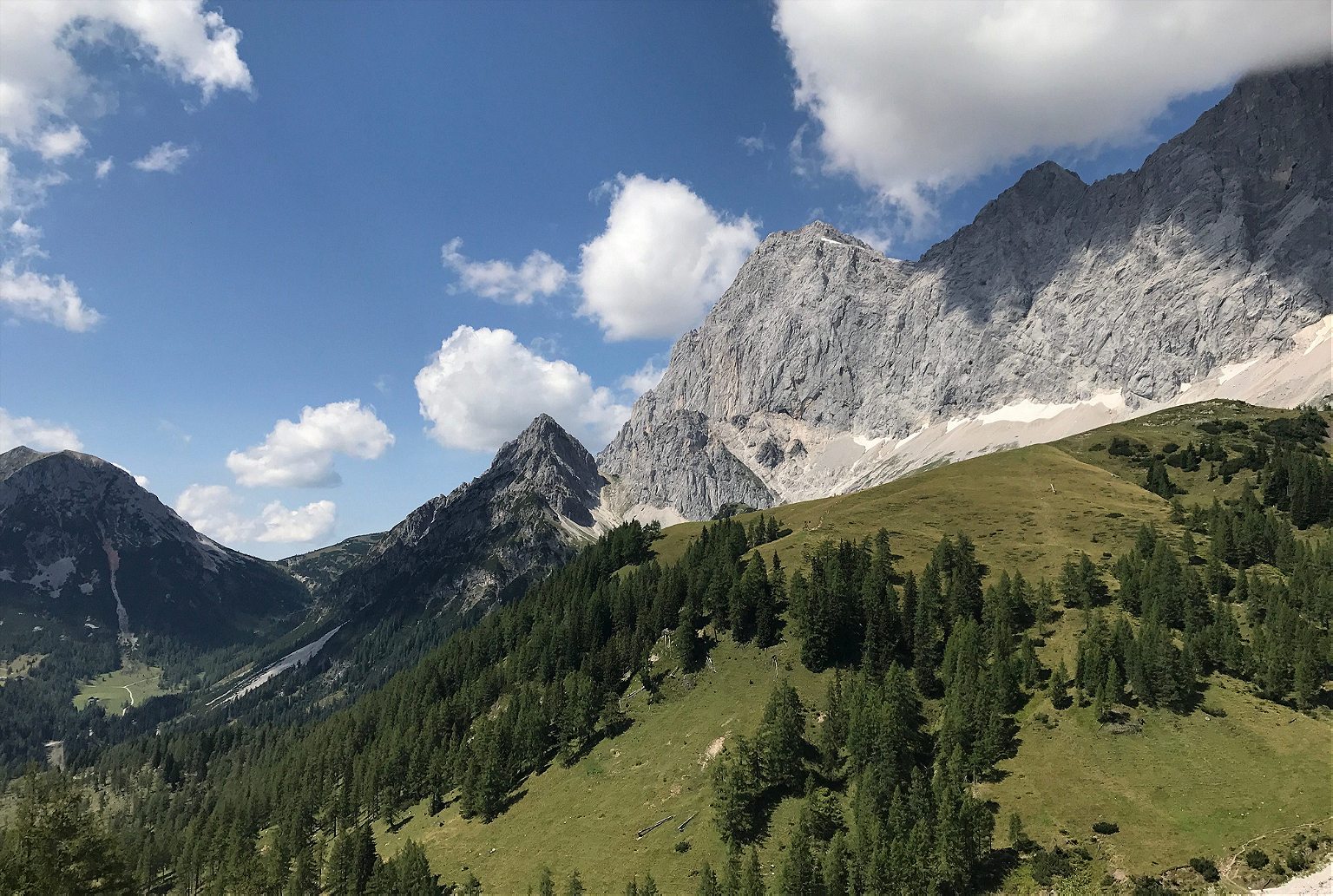
Sipping Through Austria

Writer, editor, and Vienna native Alexa van Sickle—shown here in Saint Petersburg with The Trip host Nathan Thornburgh—talks about her boozy road trip through Austria
This week on The Trip: Drinking with Exceptional People Around the World, Nathan shares a mini-bar white wine with writer Alexa van Sickle and talks about her sorta-homeland Austria. Her epic road trip story, A Farewell to the Alps, took her across her country in search of beer, wine, and booze. Along the way there is plenty of thinking about nationality, belonging, doctored wine, and sub-par whiskey.
Here is a condensed transcript of the conversation. You can listen to the full episode, for free, on Apple Podcasts, Stitcher, Spotify, or wherever you get your podcasts.
Nathan Thornburgh: Alexa, you live in Austria and you wrote this amazing piece that was something of a farewell to the country.
Alexa van Sickle: Yes. We talked last year about having a series of road trips, and an Austrian road trip came up since I was about to leave Austria, again, after getting to know it for the first time since I left when I was 17. What I had to figure out was a theme for an Austrian road trip that wasn’t super newsy and not about chocolate cake or classical music. Actually, my first idea was to try to trace the borders because Austria is one of those funny countries where, wherever you are in the country, it’s sort of absorbed the flavor of the country next to it. So there are bits that feel like Italy and there are bits that seem like Germany and Slovenia. But I realized that most of the country’s borders are actually 3,000 meters up in the Alps. That wouldn’t have worked for a huge portion of the road trip.
Thornburgh: But you aren’t Austrian.
van Sickle: No. Essentially, my immediate family is from Austria, in the sense that we were all born there. My mom is South African and my dad is English/Canadian. They met in Austria in the 1960s.
Thornburgh: So what does it mean then to be, I think you put it in your piece, Austrian-ish? Do you feel like an outsider?
van Sickle: You know, not just fully, not Austrian, but not really fully British either because although that was our nationality, we didn’t grow up there. I like to think that I’ve not really felt Austrian ever because we were always just an English-speaking family. We are a nation unto ourselves. It’s not unusual to be from somewhere else and live somewhere for a while, but we are unusual in that we were in it for the long haul.
Thornburgh: But now, you’re thinking about leaving Austria for an extended period of time, and a road trip is kind of a way to run your mind over the features of a country before you head out. I think you had a very sensible approach, which is let’s do this road trip as a series of different kinds of alcoholic beverages.
van Sickle: I’m very lucky that I managed to find something on the whiskey front. Beer wasn’t hard to incorporate into the trip because it is everywhere in Europe.
I also wrote about wine because that’s the geography that I know. I grew up in a part of Vienna that produces wine. My life was very much dictated by that. The first restaurant I ever went to probably was one of those wine taverns.
It’s been there for centuries. I also had very good family friends who were actually from the wine-producing region as well about an hour west of my home. So my used to go pick grapes for wine with them. They were from a small town of about 2,000 people, where almost every family had old vineyards or a really old wine cellar. It’s the kind of place where wine is just in the fabric of their lives.
Thornburgh: Well, let’s start with wine then. Something that you told me is that Vienna is the only capital city in Europe that has winemaking within its city limits?
van Sickle: I think the official line is that it’s the only one with a significant amount of wine produced within the city limits, and that’s 700 hectares.

Thornburgh: Austria’s wine history has had some crises in the past, hasn’t it? How does that affect what happening with Austrian wine these days?
van Sickle: So in the early 80s, the fashion for table wines was to be very, very sweet. So what I think ended up happening is they had a few bad harvests where they couldn’t make the wine sweet enough and some chemist in Vienna had figured out that glycol, which is an ingredient in antifreeze, could make the wine sweeter. I don’t think he meant to do, you know, wholesale poison an entire industry. I think some German scientist had started testing the line and it all came out quite quickly around July ’85. So in one week basically the Austrian wine industry was destroyed. They had to destroy millions of bottles.
Thornburgh: Shit. The streets ran red.
van Sickle: Exactly. It really saved Austria’s wine because, not only did it sort of level the playing field for the people who were not cheating, but it also forced them to stop focusing on sweet wines. They had to start from scratch and start to make really, really good natural wines with no funny business. So now the really strong lines coming out of Austria are dryer reds and dry whites.
Thornburgh: You had two other spirits that were your guideposts for this trip around Austria. You had beer and you had whiskey. Why whiskey and where did you find it? Is it even Austrian?
van Sickle: I just did some digging and it turns out there is a very, very small but blossoming whiskey scene in Austria. The whiskey is happening in the forest quarter in the eastern part of the country. But it seems to be that most of these places are run by people who already have a brewery or a schnapps distillery. Whiskey’s really big right now globally so they’ve decided to diversify.
Thornburgh: Where’d you go for your whiskey experience?
van Sickle: It was sort of a happy accident that I just happened to find out that there is a group of people who operate a ski resort also had barrels of whiskey inside a glacier called the Dachstein, in Salzburg. The people running aren’t making the whiskey but I tracked down the actual whiskey producers who are using the glacier water to make the whiskey. They operate about an hour away on this really, really small farm halfway up a mountain.
Thornburgh: How’d the whiskey taste?
van Sickle: Like schnapps.
Thornburgh: Like schnapps? Interesting. So that brings us to what is probably my favorite beverage among the three of these, which is beer.
van Sickle: Yes. I found this beer spa/brewery in Tyrol called Starkenberger Brauerei, which has been brewing beer for a couple of hundred years. It used to be run by women only.
Frank Dielen pours brewer’s yeast into a vat of hot water, preparing the beer spa.
Thornburgh: What does it mean to be a beer spa?
van Sickle: They are these large tanks that used to hold the beer, but are now filled with water and about a month’s worth of brewer’s yeast.
Thornburgh: Oh wow.
van Sickle: The idea is that you jump in the water and you sit in this beer broth. A large group might do it for a celebration. It’s a strange concept.
Thornburgh: Is it really hot?
van Sickle: It’s warm. It’s like a bath, but it’s sort of gloopy. It’s not unpleasant. At the end of the day, it’s a hot tub.
Thornburgh: And you go in with your bathing suit?
van Sickle: Well, I would. I would say that it’s not expected that people do that. The idea is you come with a bunch of friends and you all hang out there naked. There’s also a beer tap with unlimited beer. People come over from the U.S. to visit this spa. My guide pointed out that Starkenberger is the first beer spa of this size.
Thornburgh: If it sounds like I’m a hater, it’s because I’m a little bit of a hater. I think it sounds a little gross. Is it something that sounds weird, but once you do it, it’s amazing?
van Sickle: I mean, I wouldn’t need to repeat the experience for the yeast part of it. I’m a fan of hot tubs and a fan of crazy looking castles, and they’re interesting people there. It’s like a really old building, so sort of fun to spend time there in end. But it’s definitely an odd thing to do. I think it might be odd to fly over from LA to swim in yeast at the bottom of a castle in Austria, but I mean maybe that’s their target audience.
It’s still a functioning brewery. That’s the thing: you go there to drink beer and immerse yourself in it. If you want, you’ve got to book, you’ve got to book ahead. And it gets busy.
Thornburgh: It’s is popular so I can take all of my skepticism and just a smoke it because they’re doing business out there. Fair enough. Well, thank you for talking to me about your boozy road trip.
van Sickle: Of course.
This conversation was edited and condensed. Listen/subscribe to the podcast on Apple Podcasts, Spotify, or Stitcher.